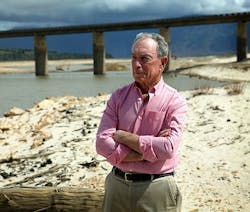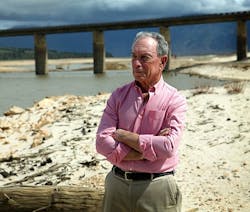DAY ZERO: Cape Town should be a wake up call - Mayor Bloomberg
CAPE Town, South Africa – New York City Mayor Michael R. Bloomberg has called for citizens around the world to take action to prevent another ‘Day Zero’ situation from potentially taking place.
In his first undertaking following as U.N. Special Envoy for Climate Action, Bloomberg toured the Theewaterskloof Dam,the largest dam supplying water to the Western Cape of South Africa.
The looming threat of ‘Day Zero’ in Cape Town – the predicted day when water supplies will run out and will be shut down across the city – had originally been moved forward to April 12 due to a drop in dam levels.
However, described by officials as a “moving target”, this was then moved back to May 11, before being moved to June 4 and most recently, July 9.
From February, Capetonians were asked to reduce water consumption down 50 litres of water per person daily in an effort to conserve supplies. As a result, urban demand has been reduced by nearly 45 percent and the agricultural sector has reduced water usage by 60 percent.
The founder of Bloomberg Philanthropies and three-term Mayor of New York City was joined by several prominent environmental and water experts to discuss the scope of the drought.
The experts joining Bloomberg included Christine Colvin, freshwater senior manager, WWF-South Africa; Peter Flower, director water & sanitation, City of Cape Town; Dr. Gisela Kaiser, executive director: Informal Settlements, water and waste, City of Cape Town; and Dr. Kevin Winter, Future Water Research Institute, University of Cape Town.
Mike Bloomberg said: “The extreme drought here in Cape Town should be a wake-up call for all who think that climate change is some far off threat. It's already here, it's making droughts and storms more dangerous, and we've got to do more to keep it from getting worse. Cities and businesses are helping to lead the way, but all levels of society in all countries - on all continents - must take bolder actions. We cannot let droughts like this become common around the world.”
Dr. Gisela Kaiser and Peter Flower, City of Cape Town, said: “Following three years of progressively reduced rainfall in the Western Cape catchment areas, the current drought has exposed our vulnerability being solely reliant on surface water from rainfall.”
In Cape Town alone, four million people depend on the city to provide water for domestic, industrial and commercial use. The system of dams further provides water for small municipalities and many agricultural users.
Kaiser and Flower added: “While the impact of climate change is hard to predict, even poorer regions must become resilient and not rely on historical climate stability. For Cape Town and the Western Cape, this requires diversified supply, reducing reliance on surface water to a substantial mix of costlier ground, desalinated and re-used water. It is both impossible and unaffordable to do this within a season, therefore reducing demand is critical.”
###
Read more
Day Zero: GrahamTek offers $2.1m temporary desalination plant to Cape Town
Day Zero: Eskom turns to mobile desalination to keep nuclear power station running
Day Zero moves forward as Cape Town’s water supplies run dry
About the Author

Tom Freyberg
Tom Freyberg is an experienced environmental journalist, having worked across a variety of business-to-business titles. Since joining Pennwell in 2010, he has been influential in developing international partnerships for the water brand and has overseen digital developments, including 360 degree video case studies. He has interviewed high level figures, including NYSE CEO’s and Environmental Ministers. A known figure in the global water industry, Tom has chaired and spoken at conferences around the world, from Helsinki, to London and Singapore. An English graduate from Exeter University, Tom completed his PMA journalism training in London.

